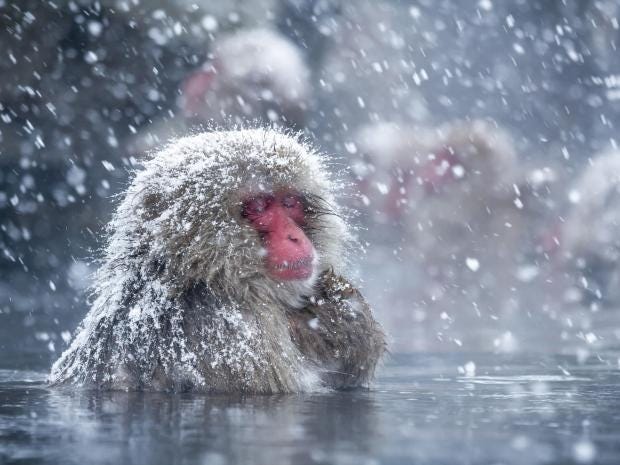
For many people, a hot bath is the perfect way to end a stressful day – and according to a new study, the same is true for monkeys.
Scientists observing a group of monkeys famous for bathing in hot springs have found their unusual behaviour decreases stress, as well as helping them stay warm.
Japanese macaques – also known as snow monkeys – are the world’s most northerly species of primates, apart from humans.
They are adapted to living in extremely cold climates, with thick layers of fur that keep them warm through the winter months.
The bathing behaviour of a population found in Jigokudani Monkey Park has long been assumed another adaptation to life in freezing climates.
It all began in 1963 when a young female macaque was spotted in an outdoor hot spring belonging to a local hotel.
Since then, many other local monkeys have copied the behaviour and the park management has even built the monkeys their own private spring.
Though observers have long assumed the monkeys were using these spas to warm up, no researchers had ever tested this assumption.
To investigate the monkey spas in greater depth, a team of researchers led by Dr Rafaela Takeshita of Kyoto University took faecal samples from bathing macaques to analyse levels of glucocorticoids – hormones associated with stress and body temperature management.
In total, the scientists studied 12 adult female macaques and followed them during the spring birth season and winter mating season.
They found that taking a bath did indeed reduce levels of these hormones, and suggested that monkeys who regularly bathed were more able to deal with the stress of living in such icy conditions.
"This indicates that, as in humans, the hot spring has a stress-reducing effect in snow monkeys," said Dr Takeshita.
She said further studies using blood or saliva samples could be used to detect additional short-term changes in stress levels.
The results of the study were published in the journal Primates.
The researchers also monitored the macaques’ bathing habits, and found they were more likely to use the springs during winter – and especially during the season’s coldest weeks.
While high ranking females were able to take advantage of their status to spend more time bathing, they had to fight to maintain this status. This meant there was a trade-off between the stress of constant conflict and the soothing effects of spa-time.
"This unique habit of hot spring bathing by snow monkeys illustrates how behavioural flexibility can help counter cold-climate stress, with likely implications for reproduction and survival,” said Dr Takeshita.
The bathing monkeys of Jigokudani are a popular tourist attraction. As part of their study, Dr Takeshita and her colleagues wanted to assess whether the daily influx of admirers into the park had any effect on the macaques’ stress levels.
They found that despite the 500 visitors coming to see them in the park every day, the monkeys’ stress hormone levels were unaffected by the presence of tourists.







